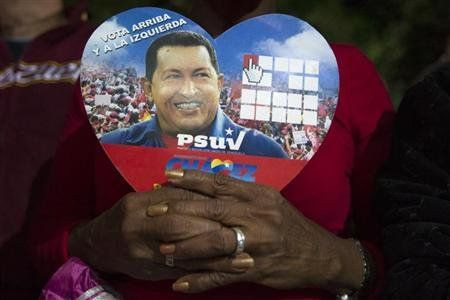Venezuela’s Opposition Demands ‘The Truth’ About Chavez’s Condition

Venezuela’s opposition Wednesday asked the government to disclose “the truth” about President Hugo Chavez’s condition, as he recuperates from a cancer surgery in Cuba.
The 58-year-old socialist leader, who won the re-election Oct. 7, has not been seen or heard in public since he underwent his fourth cancer surgery Dec. 11.
"The official version (of Chavez's health) hides more information than it gives," Ramon Aveledo, head of the opposition Democratic Unity coalition, said at a press conference, Reuters reported.
"The vice president himself has promised to tell the truth, whatever it is. Fine, he should tell it. He should tell the whole truth," said Aveledo.
He had earlier said that the secrecy was the source of the rumors that “increased uncertainty and caused anguish.”
Chavez's supporters have accused the right-wing political opponents of fueling the speculation and disrespecting his family.
Vice President Nicolas Maduro, who Chavez named as his successor if the situation took a turn for the worse, Tuesday said at Havana that Chavez had recognized the complexity of his post-operative condition. Maduro was in Cuba to visit Chavez.
In a pre-recorded interview with regional broadcaster Telesur, Maduro said Tuesday night that Chavez was "conscious of how delicate his recovery was" and that the president had urged him to keep the Venezuelan people informed "regardless of how hard the truth might be at times.”
"He's totally conscious of the complexity of his post-operative state and he expressly asked us … to keep the nation informed always, always with the truth, as hard as it may be in certain circumstances,” he added.
In the two weeks following the surgery, the government had said the president suffered post-operatory complications including unexpected bleeding and a lung infection, but offered few details about his actual condition.
Chavez had undergone three surgeries in less than a year and two sessions of radiation treatments before the presidential election and declared in May that he had beaten the disease. But details of Chavez's ailment as well as the type of cancer he is suffering from are still not known.
The Venezuelan constitution says that if a president-elect dies before taking office, a new election should be held within 30 days. In the meantime, the president of the National Assembly is to be in-charge of the government.
Chavez’s inauguration is slated to be held Jan. 10, but it is unclear if he will be able to attend the ceremony.
Opposition politicians and commentators have demanded that if Chavez is not in Venezuela to be sworn in on the scheduled date, a new election will be required to be held within 30 days.
Attorney General Cilia Flores said last week that the constitution allowed the date to be postponed, stressing that Chavez was currently Venezuela’s president who had been re-elected.
The vice president reiterated the attorney general’s statement saying there was room in the constitution to delay the swearing-in. The president had received permission from the National Assembly to be out of the country indefinitely for his cancer operation and the permission could be extended past Jan. 10, Maduro said.
© Copyright IBTimes 2025. All rights reserved.






















